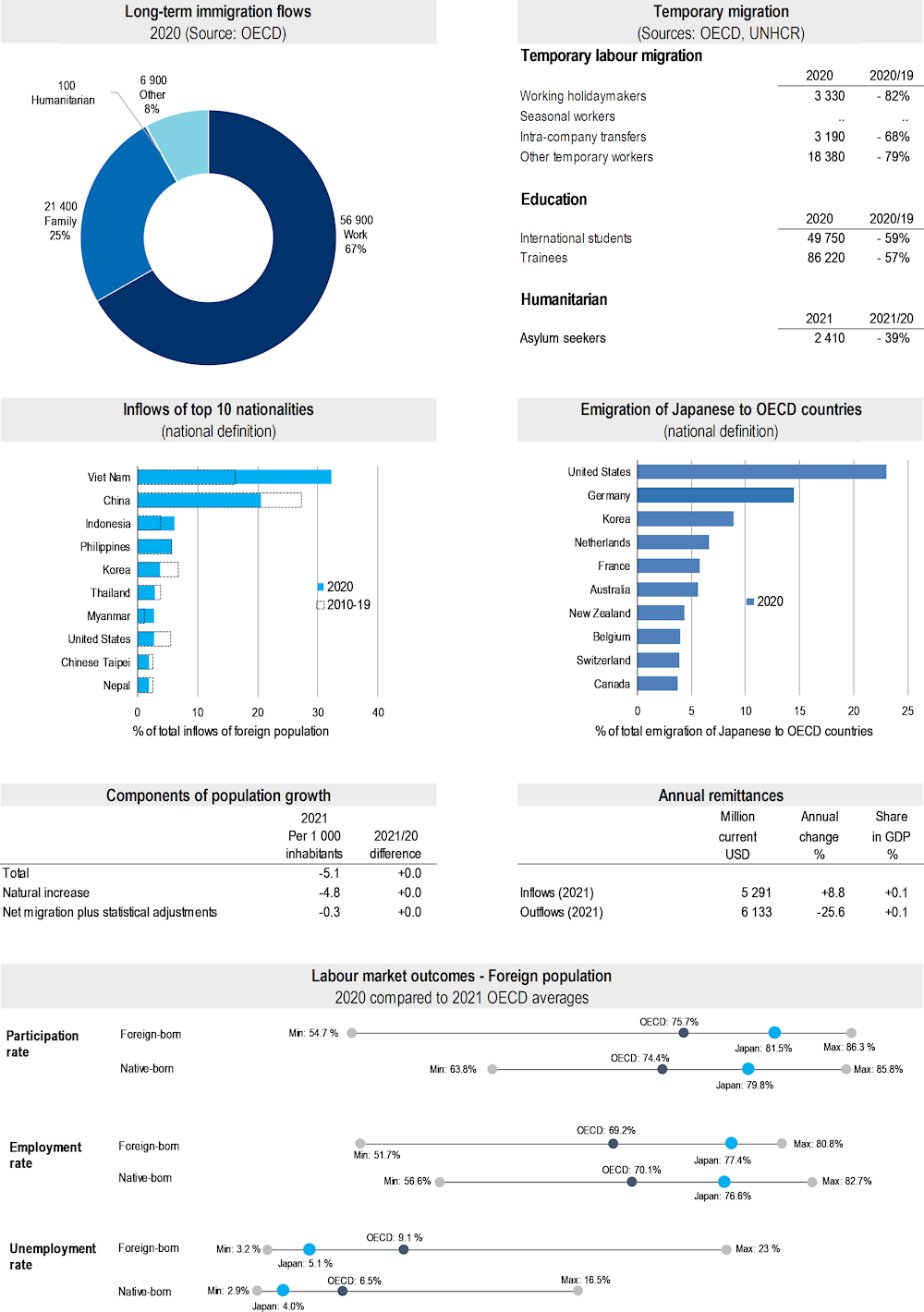In 2020, Japan received 85 000 new immigrants on a long-term or permanent basis (including changes of status), ‑38.2% compared to 2019. This figure comprises 66.7% labour migrants, 25.1% family members (including accompanying family) and 0.1% humanitarian migrants. Around 50 000 permits were issued to tertiary-level international students and 111 000 to temporary and seasonal labour migrants.
Viet Nam, China and Indonesia were the top three nationalities of newcomers in 2020. Among the top 15 countries of origin, China registered the largest decrease (‑86 000) in flows to Japan compared to the previous year.
In 2021, the number of first asylum applicants decreased by ‑38.7% to reach around 2 400. Of the 14 000 decisions taken in 2021, 5% were positive.
Between 2021 and 2022, a few changes were made to the Specified Skilled Workers (SSW) Program, a status of Residence newly created in 2019, initially allowing foreign workers to work in 14 industry fields. The application procedures for the SSW Program were amended in 2021 to merge three manufacturing fields (Machine parts and tooling; Industrial machinery; and Electric, electronics and information) into a single field. Therefore, the SSW Program is to be re‑organised under 12 industry fields.
As of May 2022, Japan has signed Memoranda of Co‑operation related to the Status of Residence of SSW with 14 countries: the Philippines, Cambodia, Nepal, Myanmar, Mongolia, Sri Lanka, Indonesia, Viet Nam, Bangladesh, Uzbekistan, Pakistan, Thailand, India, and Malaysia.
The Immigration Services Agency started accepting online applications by foreign residents themselves by identifying the applications through the use of the individual certification function of the Individual Number Card in March 2022. All foreign nationals with an Individual Number Card can now apply for residence procedures online, such as acquisition of status of residence, extension of period of stay, change of status of residence, issuance of certificate of eligibility, issuance of certificate of authorised employment, re‑entry permission and permission to engage in an activity other than that permitted under the status of residence previously granted. Only the status of residence “Diplomat” and “Temporary Visitor” are not eligible for online applications.
The Project to Promote Foreign National Entrepreneurial Activities, which started in December 2018, allows foreign entrepreneurs receiving support for entrepreneurial activities from local governments to stay in Japan to prepare for starting a business for a maximum of one year. The government decided to take necessary measures in 2022 to allow foreign nationals who were not able to start a business within the same period of stay (up to one year) to engage in entrepreneurial activities in Japan for additional six months maximum by making use of the Project for Facilitation of Acceptance of Foreign Entrepreneurs in the National Strategic Special Zones.
In December 2021, the Immigration Services Agency announced the current status of the 12 improvement measures shown in the investigation report on the death of the detainee in Nagoya Regional Immigration Bureau. Subsequently, as a part of the improvement measures, “Mission and principles of the Officials at the Immigration Services Agency of Japan” was formulated in order to reform mind and organisation of Immigration Services Agency and recommendations were compiled at the Advisory Committee to strengthen the medical system of detention facilities.
In response to the COVID‑19 pandemic, Japan has imposed restrictive border control measures. Since March 2022, some restrictions were lifted, allowing mainly short-term business travellers and new mid to long-term residents, including exchange students, to enter the country. The Immigration Services Agency made an announcement of the termination of the special measures for the visa status of persons who have difficulty in returning home country due to the effects of the spread of COVID‑19 in May 2022.
Further information: https://www.mhlw.go.jp/english/ | https://www.isa.go.jp/en/ | https://www.moj.go.jp

